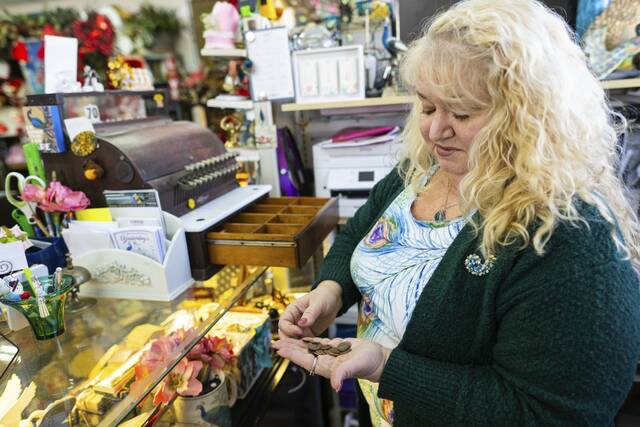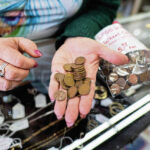Ending production of the penny makes sense, a cross-section of area coin collectors and business owners told TribLive after a directive to do so was ordered this week by President Donald Trump.
But Trump doesn’t appear to have the authority to make the decision.
The U.S. Mint is part of the Treasury Department and it derives its authority from Congress.
“Congress authorizes every coin and most medals that the U.S. Mint manufactures and oversees the Mint’s operations under its Public Enterprise Fund,” is how the Mint explains its operations on its federal website.
On Monday, Trump directed Treasury Secretary Scott Bessent to end production of the coin. Thus far, there has been no pushback to preserve the penny.
It cost $2.69 to produce 100 pennies in 2024, according to the Mint’s annual report.
There were 3.1 billion pennies shipped last year and the mint lost $85.3 million producing them, according to the report.
“I’m not a penny guy,” said West Penn Coin Club President Larry Ginsberg. “I’m not against saying goodbye to them. In fact, I’ve wondered what’s taken so long.”
Despite his passion for coins, Ginsberg of Pine said minting fresh pennies is a waste.
As for penny collectors, he said he knows plenty of people among the 70 or so club members who have stashed the copper-colored coins away for years.
Those people, he said, are saving them for “completely separate reasons.”
“They’re looking for key coins,” he said. “It’s strictly about dates and mint marks.”
The club piles pennies in a barrel and sells them 7 for $1 at its show at the Quality Inn in New Kensington.
“Some of them have a sticker attached and you can win a prize,” Ginsburg said.
Patty Wolfe, owner of Yesterday’s RAVE antique shop in Greensburg, said elimination of the penny wouldn’t affect about 40% of her customers because they use a card for purchases.
Those who use cash don’t often use pennies, she said.
“Pennies are kind of a pain. A lot of people say when they’re getting change, ‘Just keep the penny.’ They don’t want to deal with it,” Wolfe said.
While there will be an adjustment period for retailers to round prices up or down to avoid the need for a cent in change, she said minting pennies is an extra cost that trickles down to taxpayers.
Ending production of the penny would be following in the footsteps of Canada, where production of the pennies ended in 2012.
“There are plenty of pennies to satisfy the need in the economy. And when it costs 3 cents just to make a penny, this seems like a no-brainer,” said Eddie Lowy, owner of Banner Coin Exchange in Downtown Pittsburgh. “People have billions of dollars’ worth of pennies sitting around in Mason jars and other places in their houses.”
People could still collect pennies and perhaps the Mint could produce them as part of the proof sets it sells each year to collectors.
South Hills Coin Club Treasurer Dave Burdis is among those who hope so.
“I think they ought to specially make it for that purpose,” Burdis said.
Interest in numismatics — the fancy word for collecting coins — has surged in the last decade, Burdis said.
The South Hills club has more than 100 members from across the region.
“I drive 25 miles to go,” Burdis of Charleroi said of the Bethel Park-based club.
If no new pennies are struck — the term the Mint uses for making coins — the final production year may be valuable to collectors, Lowy said.
Highly collectible are from years where production was limited, Lowy said.
“When there’s a significant amount of a particular coin in circulation, they’ll cut back the production level,” he said. “So things like pennies from 1909-15 and 1931 from the San Francisco mint; from 1914 and 1924 from the Denver mint; from 1922 at the Philadelphia mint. Those are the pennies that are valuable today.”
The biggest loss from ending production of the penny may be Abraham Lincoln’s mug on a coin, according to Rich Heintz, secretary of the South Hills club.
“I think it will be a disservice by not having Lincoln on a coin. He’s on the $5, but that’s 500 pennies,” said Heintz of Bethel Park. “As a coin collector, I don’t like seeing any coin disappear.”











